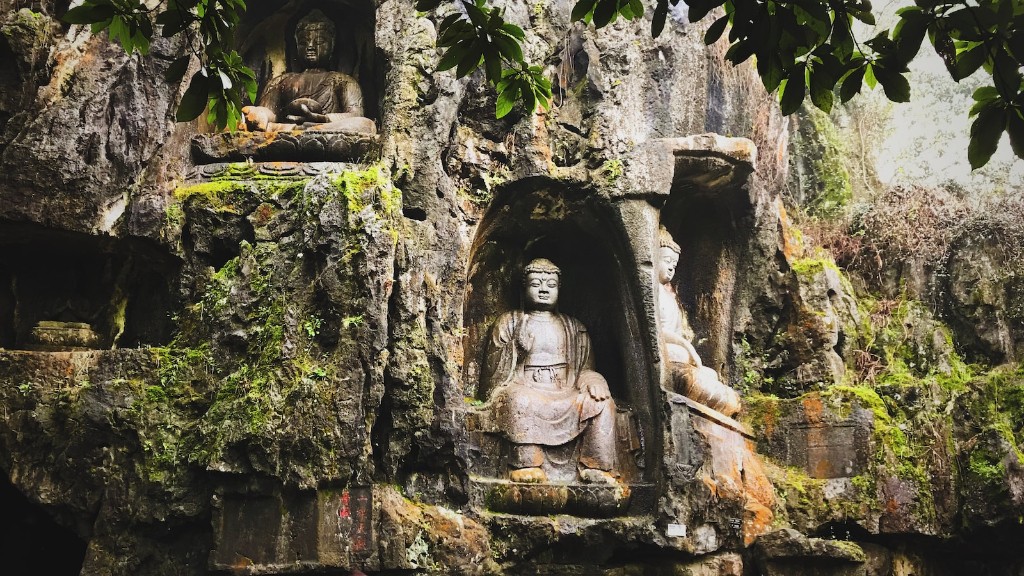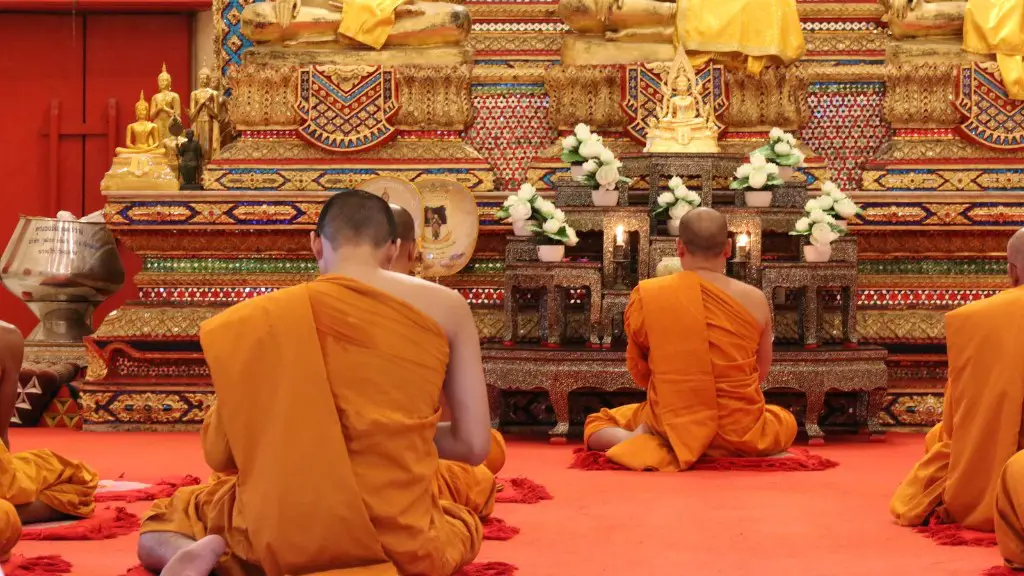Hinduism is one of the world’s oldest religions, and has a deep-seated spirituality and philosophy. It is said to be the oldest living religion and the fourth most followed religion globally. Like other religions, Hinduism has its own set of holy days and festivals to celebrate, each with their own special meaning and purpose. To understand more, here is an overview of what Hinduism holy days are and how they are celebrated.
The basic festivals of Hinduism celebrate the lives of gods, goddesses, saints, and incarnations. Each holy day is based on myths and legends within Hinduism, usually associated with a deity. Additionally, many of these days are associated with India’s changing seasons and harvests, or the moon’s cycle, as well as symbolic occasions like the start of a New Year.
The most important of the Hindu holy days is Diwali, the Festival of Lights, which is held in the Hindu month of Kartik. This five-day festival celebrates the victory of light over darkness, and marks the Hindu New Year. Diwali is also the time for prayer, renewal, and exchanging of gifts. Other popular holy days are Holi and Raksha Bandhan. Holi marks the start of spring and is known as the ‘Festival of Colors’; it is celebrated with singing, dancing, and throwing powdered color pigments on friends and family. Raksha Bandhan celebrates devotion and love between brothers and sisters.
Other important holy days and festivals of Hinduism include Mahashivratri, Mahavir Jayanti, Dussehra, and Krishna Janmashtami. Mahashivratri is dedicated to the god Shiva and involves night-long vigils and chanting. Mahavir Jayanti is the birthday of the Tirthankara, Lord Mahavira. Dussehra celebrates the victory of Rama over the demon Ravana, while Krishna Janmashtami celebrates the birth of lord Krishna.
Each Hindu holy day follows a specific set of observances and traditions. For example, prior to Diwali, Hindus make sure their homes are clean, decorate their houses with lights and candles, and take part in family worship rituals. Other days involve fasting, stories, songs and dances, and visits to temples. It’s important to note that Hindus also follow their local customs and traditions when celebrating these holy days.
Hinduism holy days are significant for both spiritual and social reasons. They provide a much-needed break from the mundane activities of everyday life and offer an opportunity to reconnect with the divine. Furthermore, these days are also celebrated with family and close friends, providing a time for strengthening relationships and coming together for celebration. In this way, Hinduism holy days help to bring people closer together.
Importance of Rituals
Hinduism holy days involve a variety of rituals, as part of the celebration. Such rituals can range from simple prayers to elaborate ceremonies. Typically, rituals involve offerings to deities, and may also involve chanting mantras and dedicating activities to the divine. This is done to honor and show appreciation to the gods and goddesses.
Rituals also help to provide a sense of continuity between generations. The same rituals that were practiced by the ancestors are carried on today by their descendants, helping to keep the faith alive and providing a connection to the past. Furthermore, participating in rituals can help to unify a community, as people come together during Hindu holy days to observe and partake.
Rituals also play an important role in Hinduism, as devotees believe that their actions have an impact on their destinies. This influence is both physical, as prayers for health or prosperity, and spiritual, in terms of the joy and satisfaction that comes from engaging in the rituals. This connection between the divine and human is a major reason why rituals are so integral to Hinduism holy days.
Significance Of Pujas
The puja is a spiritual ceremony performed in the home or temple during holy days. It is the central practice of Hindu worship, which involves the invocation of God, chanting of mantras and singing of devotional songs. A puja normally consists of offering flowers, fruit, or sweet foods to the deity, such as an image of the god or goddess, as well as the recital of sacred texts.
A puja is highly significant as it helps to establish a connection between the divine and the worshipper. During a puja, the devotee offers devotion and praise to the deity, in return for blessings and guidance. In addition to being an act of devotion, a puja can also be seen as an expression of thanks for the material and spiritual abundance that the deity has provided.
Pujas also involve the use of various objects, including incense, flowers and lamps. These are used to evoke particular energies, and to create a more uplifting environment. Furthermore, they are also thought to help direct the worshipper’s attention to the spiritual realm, facilitating a more powerful connection to the divine.
Observance and Celebrations
For Hindus, spiritual observance is a primary focus on holy days. The usual practice involves praying to various deities and engaging in rituals, such as puja. However, it is not just about worship; Hindus also celebrate the holiness of the day with joy and enthusiasm through music, dance and other forms of entertainment.
While some celebrations are large-scale affairs involving family, friends and large gatherings, others are more low-key. Even small family groups may join together to perform puja, or have a celebratory meal. On some days, there may also be special feasts and offerings, where devotees make donations of food or money to the temple.
On their holy days, many Hindus visit their local temple or shrine, or may make an offering to the deity at home. Visiting temples can also be a good way to understanding more about Hinduism as a religion and culture. Furthermore, visiting temples is a way of expressing devotion and respect to God, and an opportunity to connect with the divine.
Benefits Of Celebrating
In Hinduism, celebrating holy days is an important tradition, one that brings many benefits to those who take part. For instance, in addition to connecting people to the divine, these days also provide a perfect opportunity to express gratitude and thanksgiving to the deity. Furthermore, spending time in prayer and ritual helps to bring peace and calm to the mind and soul.
Receiving blessings from the deity can also bring about positive results. For example, if a devotee offers thanks for something specific, such as health or well-being, it may bring about heightened awareness of the blessings already in their life. Consequently, the devotee may become more appreciative and find joy in even the simplest of activities.
Holy days also provide a chance for individuals to reflect upon their life. By setting aside this time to observe spiritual practices, individuals can gain more insight into their lives and be inspired to work on personal development. This can help to strengthen relationships, bring harmony, and motivate people to find fulfilment in life.
Views of Scholars
Scholars in the field of Hinduism believe that the celebration of holy days can bring a variety of spiritual and psychological benefits. It allows individuals to establish deeper connections with their spiritual side, while also providing a deeper understanding of the mythology and culture that lies behind Hinduism. Through prayer, ritual and festive activities, people can gain a deeper sense of spirituality and inner peace.
Moreover, experts believe that taking part in holy days also provides an excellent opportunity for cultural exchange and education. Through participating in Hindu festivals, visitors can gain knowledge about Hinduism as a religion, culture and civilization. This contributes to a better understanding of the values and customs of Hinduism.
In short, Hinduism holy days offer a unique opportunity for devotees to feel connected to the divine, learn more about Hinduism, and celebrate religious tradition. With its traditional rituals, festive activities and spiritual practices, Hindus have much to gain through celebrating the holy days of their religion.
How People Celebrate
How people celebrate Hinduism holy days is greatly determined by the region they live in. While the core elements of each holy day usually remain unchanged, many Hindus like to observe them in their own unique way. The various customs, traditions and rituals associated with each festival may vary from one part of India to another, giving each area its own distinctive character.
Furthermore, individuals have the freedom to observe holy days according to their own religious and spiritual beliefs. Some devotees may choose to take part in group festivities, while others may opt to celebrate privately at home, with family or close friends. Whatever the method of observance, the focus is on inner connection, gratitude and joy.
In addition to traditional Hindu rituals, many people also celebrate the festive season by sharing gifts and food. This is a way of expressing love and good wishes to those around them, while also demonstrating respect and appreciation for the holiday. In this way, gift-giving has become an important part of many Hindu holy days.
Final Thoughts
Hinduism holy days are an essential part of the faith, providing a way for devotees to connect with the divine. Through the spiritual practice of prayer, ritual, and festivities, Hindus can gain spiritual wisdom and enjoy a greater sense of joy and wellbeing. Additionally, the celebration of these holy days also serves to unite people of all backgrounds and cultures, promote respect for one another, and develop a deeper understanding of Hinduism.



